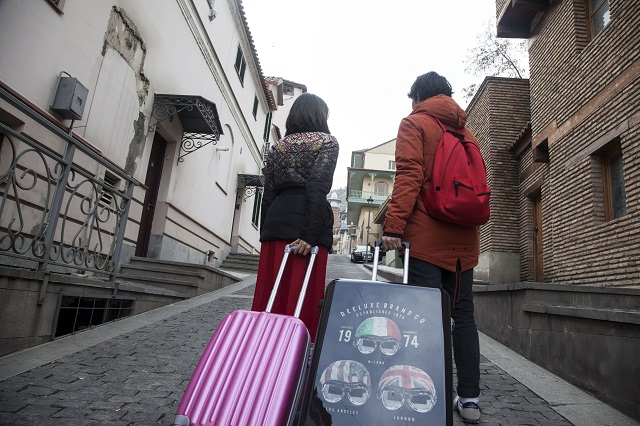Gov’t announces tough measures to prevent violations of Georgia-EU visa free deal

Georgian Prime Minister Giorgi Kvirikashvili has confirmed today that new regulations will be established concerning the changing of surnames to prevent Georgian citizens from violating the Georgia-EU visa free regulations.
The PM stated that some Georgian citizens have changed their surnames several times in order to illegally reside in the EU.
Entering the Schengen Zone through the changing of one’s surname is a crime and we will make the procedure more complicated. The decision has been agreed upon with EU partner states and I hope that the citizens of Georgia will understand the importance of the step. We [the government] should take all necessary measures to avoid threats to the Georgia-EU visa waiver,” Kvirikahsvili said.
Kvirikashvili stated that the new regulation for changing of surnames, prepared by the Ministry of Justice of Georgia, will be only one section of the complex plan by the Georgian government to prevent violations of the Georgia-EU visa free regime.

The PM stated the government will do its utmost to avoid threats for the Georgia-EU visa waiver. Photo from the Prime Minister's press office.
As of now, a citizen of Georgia or a stateless person, whose birth is registered in Georgia, has the right to change their name and/or surname. However, their personal number given at the time of birth registration remains unchanged.
- According to the planned changes, which now must be approved by parliament, an individual will be able to change the surname only once when he/she is 18-year-old or older. This may happen if fatherhood is ascertained and the individual decides to take father’s surname.
- Changing of surnames or merging of surnames is possible when people marry or divorce. However, such a procedure will be possible only during marriage or divorce.
- Those Georgians who changed their surnames after the Georgia-EU visa waiver came into play on March 28, 2017, will not be able to do so again, except in the case of marriage or divorce.
The Georgian Dream government has also promised to work closer with partner states, Germany among them, to decrease the number of illegal Georgian migrants.
Georgia has addressed Germany to grant Safe Country status to Georgia, which would prevent Georgians from receiving refugee status.
For its part, Germany has taken several steps to prevent illegal migration from Georgia.

Germany will prevent those who have been refused asylum from entering the Schengen zone for several years. Photo by N.Alavidze/Agenda.ge.
Christian Klos, the Head of Migrant law division at Germany’s Interior Ministry and Annett Gunther, the Commissioner for Refugees and Migration at the Federal Foreign Office, are visiting Georgia.
The press release released by the German Embassy to Georgia reads that the number of Georgian asylum seekers in Germany has increased three times since March 2017, from the date Georgia gained the visa waiver with the EU.
In January alone, more than 700 Georgian citizens asked for asylum in Germany and nearly 100 percent were denied,” the embassy stated.
The embassy reported that the increased number of asylum seekers has caused concerns in Germany.
In order to change this trend, Germany wishes to further intensify cooperation with Georgia on readmission issues.
Also, Germany will prevent those who have been refused asylum from entering the Schengen zone for several years”, the embassy announced.
The embassy underscored that Germany supports Georgia-EU visa liberalization and sees the agreement as a chance to further enhance diverse cultural, economic and public relations with Georgia.
The Georgian Interior Minister Giorgi Gakharia stated that the visit of the German delegation is not about the suspension mechanism.

The Interior Ministry delegation will visit Europol this week, to agree on a mechanism against the illegal flow from Georgia to the EU. Photo from the Interior Ministry press office.
Suspending the visa free travel for Georgia in the EU is not on the agenda. This is a technical visit during which we will inform the German officials about our intentions to prevent the illegal stay of Georgians in the EU.
By the end of the week, we [the Interior Ministry] will visit the Europol and we will speak about a concrete mechanism over the exchange of operative information,” Gakharia said.
- The Georgia-EU visa waiver came into play on March 28, 2017.
- Georgian citizens holding biometric passports can travel to the EU’s Schengen Zone for a period of 90 days within any 180-day period for purposes other than working.
 Tweet
Tweet  Share
Share